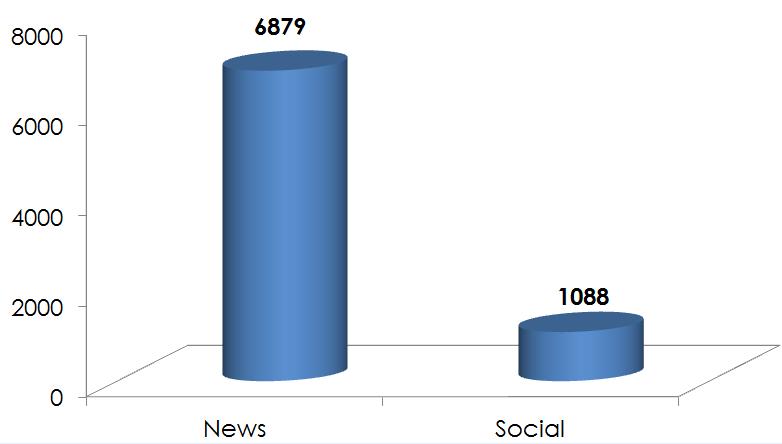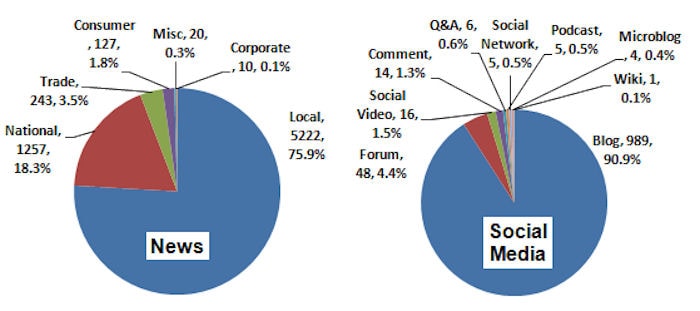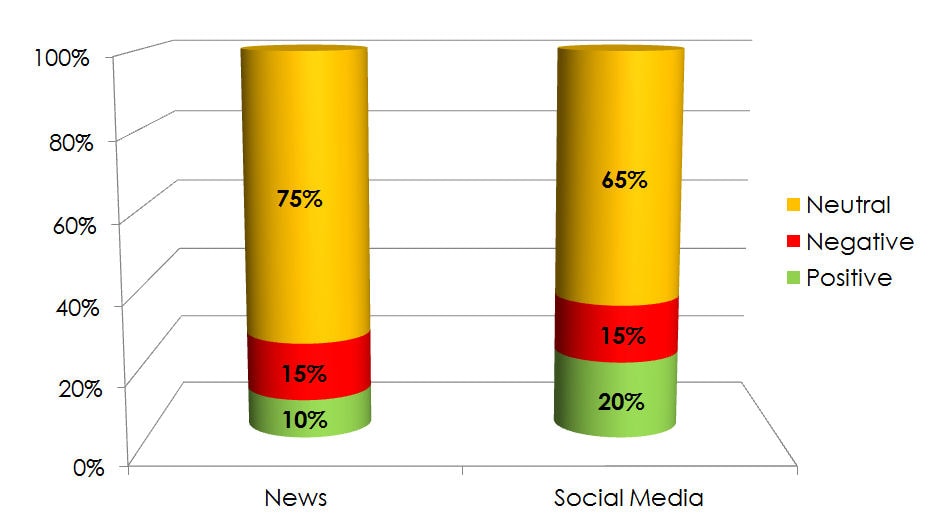It was back in July 2011 that prime minister David Cameron announced a two-part inquiry investigating the role of the press and police in the phone-hacking scandal, and Lord Justice Leveson was appointed as chairman of the inquiry. And since the Leveson inquiry began, it has never been out of the news.
News vs Social Media Volume
(Total Volume: 7967 mentions)


Source: Echo Sonar: The Leveson Inquiry, UK Online Media Analysis, Weeks 1 – 4 Comparison
As it is a story about the media, it is no surprise that the media is keen to report on each and every development. We asked research firm Echo Sonar to analyse January’s coverage, and found that not only were news sources far more interested in the inquiry than social media sources, but that news coverage was only half as positive as social media coverage.
Tonality of Coverage

Source: Echo Sonar: The Leveson Inquiry, UK Online Media Analysis, Weeks 1 – 4 Comparison
Most articles simply detailed the progression of the Leveson Inquiry, but key points of the coverage in January were:
-
The Press Complaints Commission (PCC) was under great scrutiny. It was accused of failing to prevent press harassment.
-
Richard Allen, Facebook director, was exposed as owning two Facebook accounts despite claiming a crackdown on bogus identities.
-
A number of social media discussions focused on the inquiry hearing that negative stories about Muslims encourages prejudice
- Paul Dacre, editor of the Daily Mail, admited that phone-hacking may have taken place without his knowledge.
The Leveson Inquiry is highlighting the media’s misconduct and may, eventually, have an impact on press freedom. But what does it mean for the PR industry? Caroline Kinsey, chairman of PR agency Cirkle, thinks that it doesn’t mean much. She says: “I think Leveson will create a new independent complaints commission with compulsory membership and bigger teeth. While we might like to think of a more transparent, and arguably credible, media having benefits for the PR industry, the reality is it will make very little difference.”
Tom Leatherbarrow, head of B2B at agency Willoughby Public Relations, says that the sections of PR that will be affected are those working within the criminal justice system. He explains: ”The New York Times has alleged (strongly denied) that PR people working within the Met’ ‘reminded’ serving police officers on Operation Weeting of the downside of pursuing phone-hacking allegations. My gut feeling is that, ultimately, PROs working within the criminal justice system and officers who are required as part of their jobs to meet the media, will have to work within a code of practice.”
Discussing how the press is being affected by the inquiry, Leatherbarrow says that Leveson is the tabloids’ worst nightmare: “For years, the British tabloid press went about its business secure in the knowledge that it would always have the last word. Got caught printing a false story? ‘Never mind, we’ll print a retraction on page 42.’ Leveson has given the victims access to the microphone for the first time and the print media’s modus operandi and its impact, which has included suicides and stays in mental health institutions, has been laid bare for all to see.”
Methodology
PRmoment asked Echo Sonar to analyse online media coverage of the Leveson Inquiry in UK online news and social media sources. The research period was 1 January to 31 January 2012. Metrics included share of voice, volume and sentiment analysis.
If you enjoyed this article, sign up for free to our twice weekly editorial alert.
We have six email alerts in total - covering ESG, internal comms, PR jobs and events. Enter your email address below to find out more:




